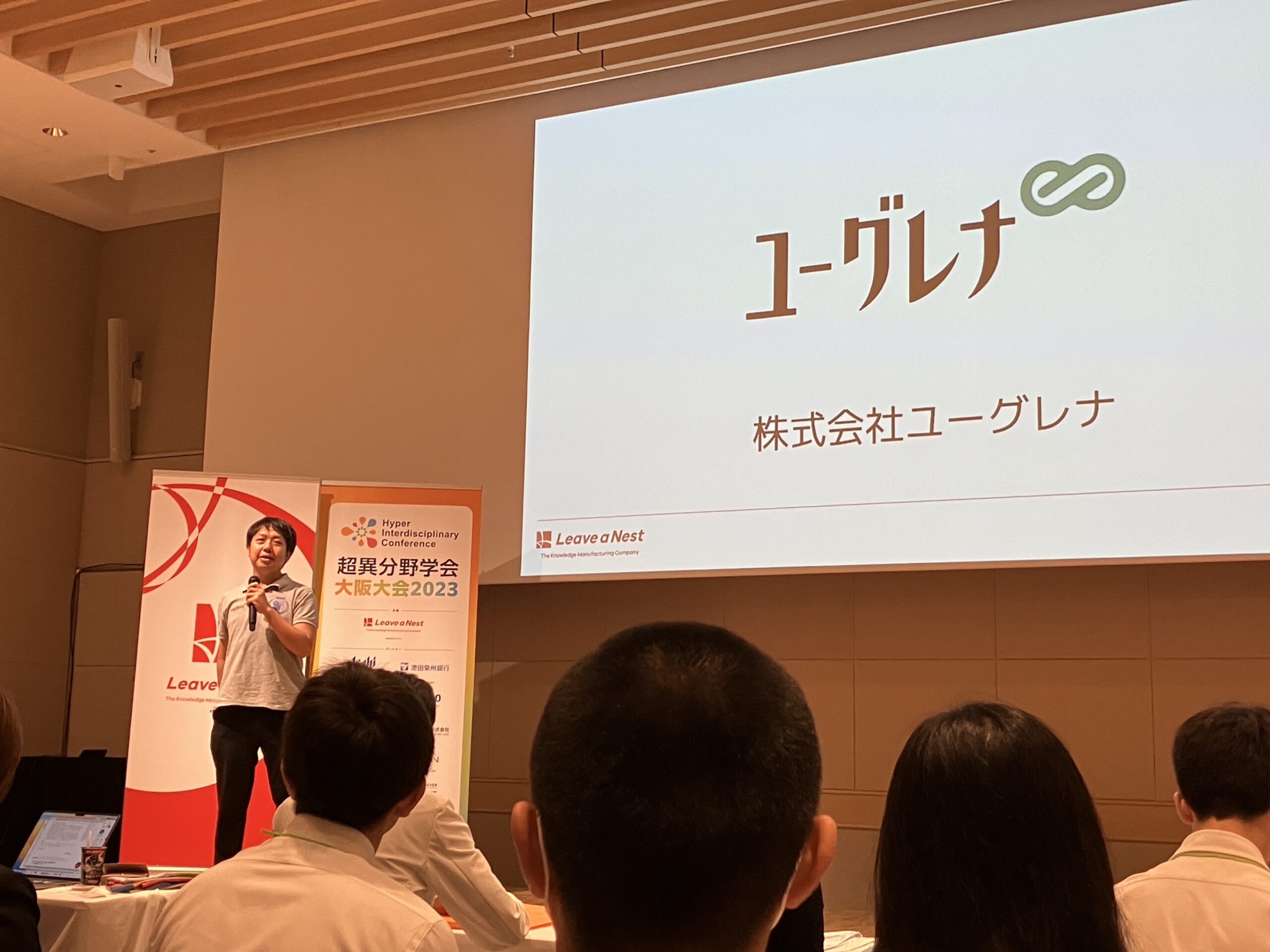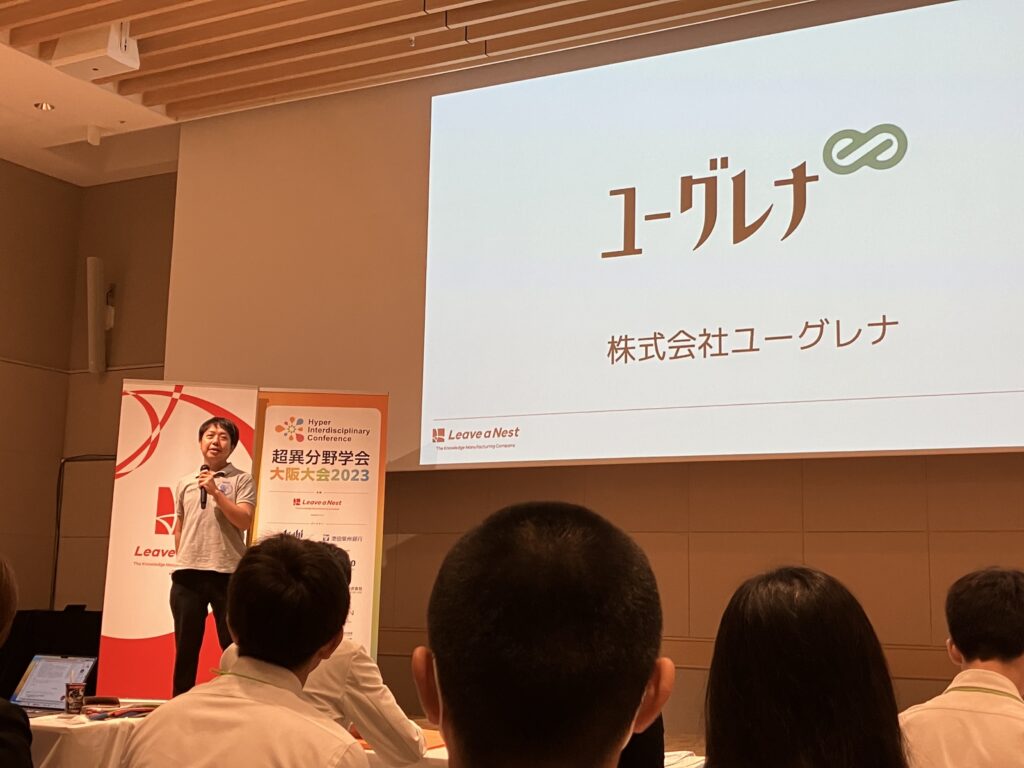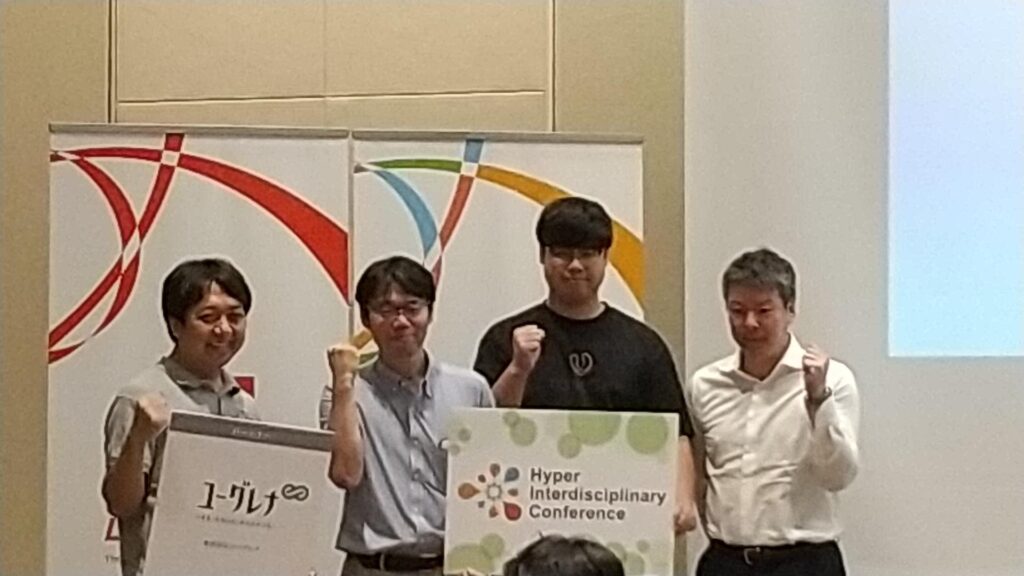
Panel Discussion: Small Decomposers and Planetary Health Carrying the Future of Earth
Since the birth of plants on Earth, they have contributed to the planet's richness through a continuous process of growth and decomposition. In this process, small organisms such as microorganisms and insects play a crucial role as decomposers. While the growth and decomposition processes have long maintained a balance, the excessive discharge of plant residues by human activities has disrupted this equilibrium.
At the "Panel Discussion: Small Decomposers and Planetary Health" held during the Hyper Interdisciplinary Conference 2023 in Osaka, the focus was placed on the power of microorganisms and insects, and the potential for generating new industries to enhance planetary health was extensively discussed. The following report summarizes the contents of this session.

The session began with a presentation by the moderator, Dr. Suzuki, CTO of Euglena Co., Ltd., who discussed approaches related to planetary health. He addressed climate change as a planetary boundary and highlighted methods to enhance human and planetary health. Specifically, he elaborated on using traditional Indonesian fermented soybean food, Tempe, as a protein source and the advantages of incorporating Euglena into fermented foods. Additionally, he proposed the concept of "Planetary Hamburg" – utilizing woody biomass to produce protein – as a topic for discussion during the session.
Dr. Hara from the University of Tokyo presented proposals for solving waste disposal issues in Malaysia's industries using microorganisms. He emphasized the uniqueness and value of local microorganisms while acknowledging the challenges involved in their exploration.
Next, Mr. Ishibashi from TOMUSHI Co., Ltd. took the stage and introduced a new business initiative involving the utilization of a large volume of organic waste for breeding stag beetles. The specific business model was outlined as follows:
Collection of organic waste - Gather agricultural waste, such as post-mushroom cultivation materials and livestock-related waste.
Conversion of organic waste into feed - Employ TOMUSHI's technology to process various organic wastes into animal feed and conduct joint research with national universities.
Waste treatment by the power of insects - TOMUSHI conducted various research and experiments to develop insects specialized in waste treatment.
Utilization as a new resource - Extract protein derived from insects and sell it as various insect-based products for aquaculture and livestock feed alternatives.
This approach demonstrated their commitment to environmentally-conscious business practices.
Dr. Matsuura from Kyoto University then addressed the audience, providing an outlook for the year 2050 when the world's population is expected to increase by 1.3 times. He highlighted the serious issue of competition between livestock feed and human food and the substantial amount of unused wood materials generated from forest remnants and disaster-stricken trees. He presented an initiative using termites and chickens to connect these underutilized wood materials to new food production. His resource-circulating food production model, WILFood (Woods-Insect-Livestock-Food), is expected to extend beyond Japan and make a global impact.
During the panel discussion, possibilities for the next-generation food culture through insects and mushrooms were deliberated from the perspectives of taste, pricing, and productivity. It was confirmed that to promote the new food culture, it is crucial to demonstrate the advantages compared to traditional food products to consumers. Additionally, as termites and stag beetles possess distinctive flavors, it was suggested that gradual popularization should begin by using them as chicken feed before introducing them as a human food source.
Finally, a consensus was reached on the potential of small organisms and the necessity of collaboration from various research institutions and industries. The participants at the venue were called upon to comprehend and cooperate with this vision.

【Panelist Profiles】
〈Panelist〉
Mr. Yosuke Ishida
CEO, TOMUSHI Co., Ltd.
Born in Odate City, Akita Prefecture, Yoosuke Ishida is a 26-year-old entrepreneur and the CEO of TOMUSHI Co., Ltd. During his studies at Aoyama Gakuin University, he embarked on an internship at a startup and later founded his own venture in Shibuya, which unfortunately did not succeed. He returned to Akita Prefecture and devoted himself to researching stag beetles since 2018. In 2019, he established TOMUSHI Co., Ltd., with initial funds provided by his grandparents, starting the company from a garage. Having grown up in the generation of "Mushi King" enthusiasts, he is now working tirelessly to spread the power of beloved stag beetles across Japan and around the world.
Dr. Kenji Matsuura
Professor, Graduate School of Agriculture, Kyoto University
Kenji Matsuura graduated from the Faculty of Agriculture, Kyoto University, and completed his doctoral program in agriculture at Kyoto University Graduate School of Agriculture, earning a Ph.D. in agriculture. He has previously served as a postdoctoral researcher in evolutionary biology at Harvard University and as an associate professor at Okayama University before assuming his current position in 2012. Since 2022, he has also been serving as an Executive Officer (Research and Evaluation) at Kyoto University. His specialties include social biology, evolutionary ecology, and applied entomology. With the theme of "Understanding Insect Societies," he conducts research on the reproductive systems, pheromones, behavior, and evolution of termites. He is also involved in developing a new food production system using termites, which involves propagating termites using underutilized plant biomass as livestock feed. He has authored books such as "シロアリ-女王様,その手がありましたか!" (Iwanami Shoten) and others.
Dr. Hirofumi Hara
Adjunct Associate Professor, Graduate School of Agricultural and Life Sciences, The University of Tokyo
Hirofumi Hara graduated from Kurume National College of Technology in 1996 and completed his doctoral program at Nagaoka University of Technology Graduate School of Engineering in 2003. After serving as a postdoctoral researcher at the University of British Columbia, Canada, from 2003 to 2006, and as a postdoctoral researcher at the Graduate School of Agricultural and Life Sciences, The University of Tokyo, from 2006 to 2008, he joined Okayama University as a faculty member from 2008 to 2013 and later worked as a lecturer and associate professor at Malaysia-Japan International Institute of Technology, Universiti Teknologi Malaysia, from 2013 to 2021 before assuming his current position in 2021. He is engaged in basic and applied research on the unique functions of microorganisms present in various environmental conditions.
〈Moderator〉
Kengo Suzuki
CTO, Euglena Co., Ltd.
Holds a Ph.D. in agriculture and a Ph.D. in medicine. During his studies at the University of Tokyo in 2005, he was involved in the establishment of Euglena Co., Ltd., and has since been one of the co-founders responsible for research and development. He focuses on technological development related to large-scale cultivation of Euglena, a type of microalgae. In 2016, he obtained his Ph.D. in agriculture from the University of Tokyo and his Ph.D. in medicine from Kitasato University Graduate School of Medical Sciences in 2019. Currently, he serves as the Team Leader of the Microalgal Production Control Technology Research Team at RIKEN, Visiting Professor at Malaysia-Japan International Institute of Technology, Universiti Teknologi Malaysia, and Special Appointed Professor (Visiting) in the “Advanced Graduate Program for Future Medicine and Health Care” at the Tohoku University.
